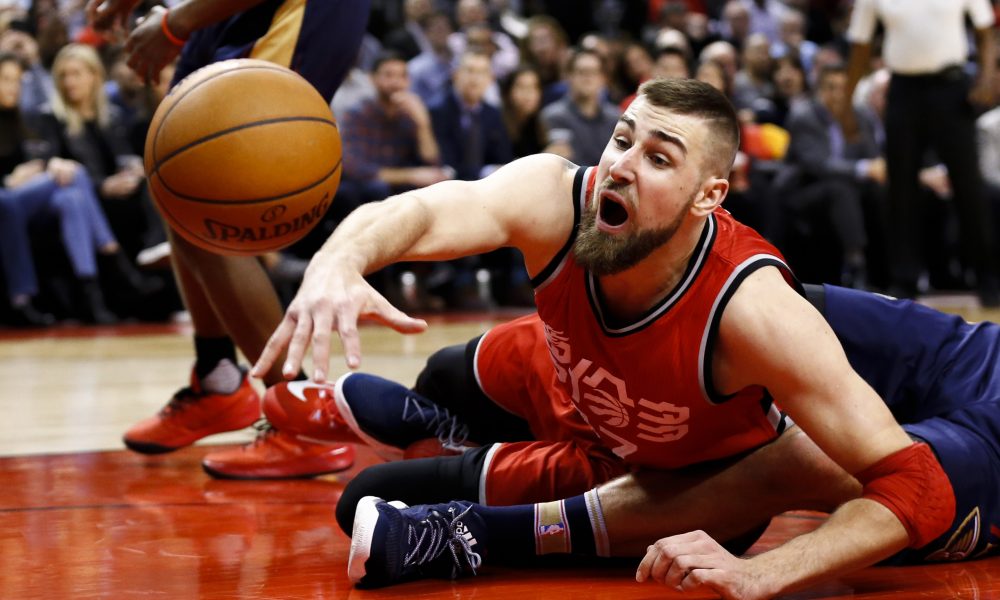To pre-empt the outcry, I’d like to state that the Raptors certainly have other issues beside the ones I’ve chosen to focus on (the need for consistent three-point shooting from roleplayers for example). Nonetheless, I find the defensive changes to have caused the greatest differentiation in performance between this season and last. In addition, while the loss to Boston stung, I actually found more positives than negatives to take from that game, resulting in a slight uptick in my optimism meter after a pretty bleak January. And now, onto the rest of the article.
With the regular season past the halfway mark, the conclusion that the Toronto Raptors have regressed defensively appears inevitable. This is despite the fact that the club’s personnel had very little turnover from the prior year. Yes, the team’s defensive backbone and backup center Bismack Biyombo left to the sunshine state, but could that alone have changed the team’s defensive fate so much? After all, Biyombo only played 22 minutes per game. From a numbers standpoint, Lucas Nogueira has filled his shoes expertly while learning on the job, outperforming Biyombo by providing 1.9 blocks per game to Bismack’s 1.6 in comparable playing time. Here, the numbers don’t tell the whole story.
Where Bismack lacks offensive skill as compared to Bebe, he makes up for it with brute strength and resolve. While Nogueira blocks and alters shots in the paint, it remains questionable whether he actually deters players from attacking. Lucas appears to be a top-notch teammate and more sportsmanlike than any professional athlete I’ve witnessed – to the point of consistently checking on opposing players after minor contact in the paint and offering a hand to pick them up (a role traditionally reserved for the downed player’s own teammates). While that is not a negative in itself, there is something to be said for wanting the anchor and backbone of your defensive line to have a bit of ‘badness’ to his play.
And that’s where the difference between Biyombo and Nogueira lies – Biz, while remaining an excellent teammate and locker room presence as far as anyone can tell, carrying himself with poise and an endearing smile in interviews, has another side. The side Raptor fans saw when he stood up to Russell Westbrook early last season; the side that saw him forcefully reject two of the league’s elite finishers at the rim in Irving and James in the playoffs. This is a man who refuses to allow all-inclusive vacations inside his squad’s paint, and it is a man well missed.
Talent is not everything in the NBA, despite the ultimate proverb that dictates otherwise. While grit and hard work alone likely won’t get one all the way to an NBA championship, they can pave a considerable portion of the path. While Nogueira is recognized to be more technically gifted than Biyombo, the lion tamer possesses a toughness that can prove the difference between an Eastern Conference finals appearance and a first round exit.
Biyombo’s departure is not the only one contributing to Toronto’s defensive regression however. Andy Greer, the lead defensive assistant from last season, left to join Tom Thibodeau in Minnesota, apparently taking his efficient schemes with him. As has been widely discussed, the Raptors opted to change their strategy on that end of the floor, hedging aggressively with the bigs and going over screens with the guards. This is where my personal cognitive dissonance begins – what happened to ‘if it ain’t broke…’?
The Raptors defensive system allowed a host of open threes last season, ranking second from the bottom in opponent three-point shooting percentage. While that hurt them when their opponents shot lights out (and hampered them in contests against teams with multiple excellent shooters ie. Cleveland), they essentially dictated the style of play, forcing their opponent to beat them from outside. Their ultimate bet was that teams wouldn’t stay hot from beyond the arc for more than three contests out of seven. On the other hand, the Raptors ranked 5th in opponent 2-point field goal percentage, and were among the league leaders in preventing dunks and layups. The conservative system (along with Biyombo’s presence when Valanciunas rested) made sure Toronto always had a strong defensive rebounder near the basket, ranking 7th in rebounding percentage on that end. As the year over year comparison shows, the team regressed significantly in all of these categories, while improving only marginally in defending the three-point line. It’s that trade off that threatens to prove their downfall (relatively speaking, of course).
The coaching staff headed by Dwane Casey has done an excellent job in many aspects throughout these last few seasons, but this year’s defensive course correction has proved to be ill conceived. Greer’s departure would not have drained the staff of the knowledge of how to play the schemes, having seen first-hand their inner workings last season. The resulting conclusion – it was a conscious choice by Casey and co. to change the approach. Knowing what a playoff series without strong interior presence looks like for Toronto, it is imperative that something be done about this issue ahead of April. While a trade for a strong interior defender may help, a rollback of the defensive method may have a similiar effect. Herein lies the benefit of continuity – most of the team’s rotation players know last year’s system, and won’t require a training camp to implement the changes. Otherwise, Canada’s basketball team risks taking a step back come playoff time.





